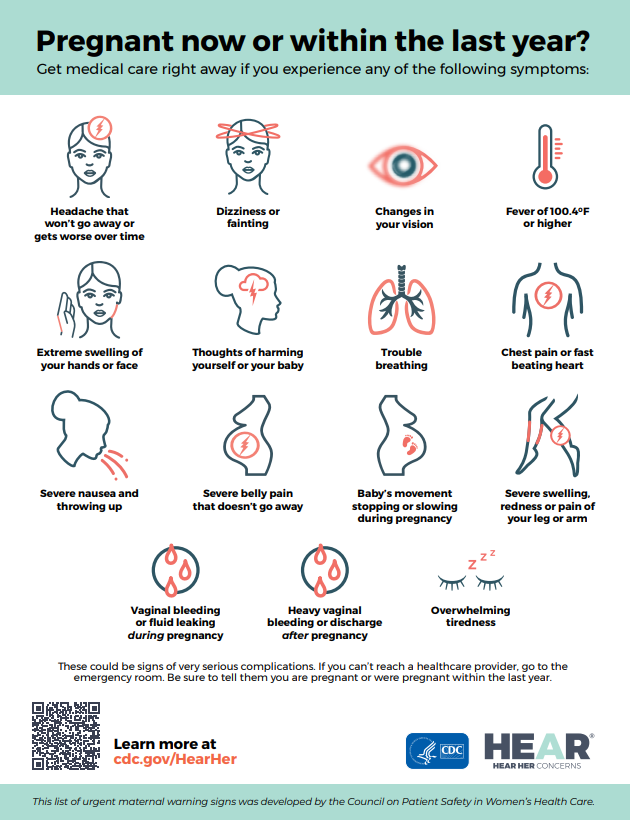Trust Her. Support Her. Hear Her.
Learn the Warning Signs. It could help save a life.

More than 700 women die each year in the United States due to pregnancy-related complications up to one year after giving birth. In Indiana, there were a total of 92 cases of pregnancy-associated deaths in 2020. Out of these deaths, approximately 79% of reviewed pregnancy-associated deaths were preventable.
The Indiana Department of Health is committed to enhancing initiatives focused on prevention of maternal mortality and morbidity through education, resources and awareness. The Hear Her Indiana Campaign aims to empower women and their support networks to know the urgent maternal warning signs and to learn how to advocate for oneself. The campaign is dedicated to encouraging everyone, including providers, caregivers, family, and friends to listen and act.
We all have a role to play in preventing maternal deaths. Learn about urgent maternal warning signs, discover how you can help, and hear Indiana women tell their stories below.
- Urgent Maternal Warning Signs
Urgent maternal warning signs are symptoms that may indicate you have a serious medical condition. Look for urgent maternal warning signs during pregnancy and for a year after.

If something doesn’t feel right, talk to your healthcare provider. If you can’t reach your provider, go to an emergency room, or call 9-1-1, and be sure to tell them if you are pregnant or were pregnant within the last year.
Urgent Maternal Warning Signs:
- Headache that won’t go away or gets worse over time
- Dizziness or fainting
- Thoughts about hurting yourself or your baby
- Changes in your vision
- Fever
- Trouble breathing
- Chest pain or fast-beating heart
- Severe belly pain that doesn’t go away
- Severe nausea and throwing up (not like morning sickness)
- Baby’s movements stopping or slowing during pregnancy
- Vaginal bleeding or fluid leaking during pregnancy
- Vaginal bleeding or fluid leaking after pregnancy
- Swelling, redness, or pain of your leg
- Extreme swelling of your hands or face
- Overwhelming tiredness
- Maternal Health Risks
Certain health conditions before pregnancy can worsen or cause pregnancy-related complications. Learn more about common conditions that can increase maternal health risk.
Risk factors, but are not limited to:
- High Blood Pressure
- Mental Health, Depression and Anxiety
- Diabetes
- Maternal Age
- Pre-pregnancy Weight
- Infections
- Substance Use and Substance Use Disorders
- Intimate Partner Violence
- Information for Partners, Families, and Friends
If a pregnant or recently pregnant women expresses concerns about any symptoms she is having, take the time to Hear Her. Listening and acting quickly could help save her life!
If she says that something doesn’t feel right, act. Encourage her to get medical help right away.
More ways to support her:
- Help her contact a healthcare provider.
- Help her brainstorm questions to ask the doctor
- Offer to go with her to get medical care.
- Listen and take notes during her medical visits.
- Help her to ask questions during doctor visits.
- Advocate for her to make every decision about her medical care.
- Share information with her about urgent maternal warning signs.
- Encourage her to speak up if something doesn’t feel right.
- Check-in with her regularly to find out how she is feeling physically and emotionally.
- Remind her you are here to support her and listen to her concerns.
- Encourage her to go to prenatal and postpartum visits.
- Offer to be her advocate by looking-up information she needs.
- Information for Healthcare Providers
What can you do to improve maternal safety?
- Always ask whether your patient is pregnant or was pregnant in the last year.
- Listen to women and hear their concerns.
- Tell your patients and community about the urgent maternal warning signs, and when to get medical care right away.
- Educate your patients about pregnancy-related health concerns.
- Help patients understand and manage chronic conditions or conditions that may arise during pregnancy, like hypertension, diabetes, or depression.
- Address health disparities.
- Engage your patients in every decision about their medical care.
- Recognize and address pregnancy-related complications before they become serious.
Clinical Guidance:
- Campaign Resources
The Hear Her campaign has produced several resources to raise awareness about urgent maternal warning signs and improve communication between health care providers and their patients. Spread the word by downloading, sharing, and posting to your networks. Help spread the message by accessing free resources here.
